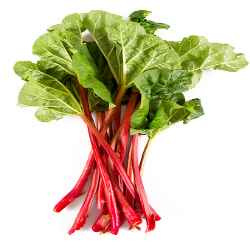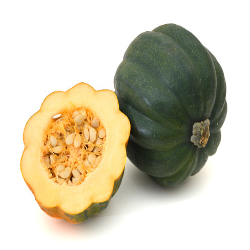Rhubarb Nutrition facts
Rhubarb

Rhubarb is a perennial herb grown for its attractingly succulent, rose red, edible leafy stalks. This cool-season plant is native to Siberia and widespread in many regions of Europe and North America as a “pie plant.” In its natural habitat, the plant expands over the ground surface as a large spread.
Botanically, it belongs to the family of Polygonaceae, in the genus: Rheum, and known as Rheum rhabarbarum.
Similar Food
-
 Acorn squash 40 Cal
Acorn squash 40 Cal -
 Amaranth greens 23 Cal
Amaranth greens 23 Cal -
 Artichoke 47 Cal
Artichoke 47 Cal -
 Arugula 25 Cal
Arugula 25 Cal -
 Asparagus 20 Cal
Asparagus 20 Cal
Source of Calorie
21
Calories
-
Carbs4.54 g 77%
-
Protein0.90 g 15%
-
Fat0.20 g 8%
How long to burn off 21 Calories?
*Approximate base minutes for a 25-year-old, 65 kg adult at moderate intensity.
Swimming
4
min
Jogging
3
min
Cycling
3
min
Walking
5
min
| Nutrition Principle | Nutrition Value | Percentage of RDA |
|---|---|---|
| Principle | ||
| Energy | 21 Kcal | 1% |
| Carbohydrates | 4.54 g | 3% |
| Protein | 0.90 g | 2% |
| Total Fat | 0.20 g | 1% |
| Cholesterol | 0 mg | 0% |
| Dietary Fiber | 1.8 g | 5% |
| Vitamins | ||
| Folates | 7 µg | 2% |
| Niacin | 0.300 mg | 2% |
| Pantothenic acid | 0.085 mg | 1.5% |
| Pyridoxine | 0.024 mg | 2% |
| Riboflavin | 0.030 mg | 2% |
| Thiamin | 0.020 mg | 2% |
| Vitamin A | 102 IU | 3.5% |
| Vitamin C | 8 mg | 13% |
| Vitamin E | 0.27 mg | 2% |
| Vitamin K | 29.3 µg | 24% |
| Electrolytes | ||
| Sodium | 4 mg | 0.5% |
| Potassium | 288 mg | 6% |
| Minerals | ||
| Calcium | 86 mg | 8.5% |
| Copper | 0.021 mg | 2% |
| Iron | 0.22 mg | 3% |
| Magnesium | 12 mg | 3% |
| Manganese | 0.196 mg | 8.5% |
| Phosphorus | 14 mg | 2% |
| Selenium | 1.1 µg | 2% |
| Zinc | 0.10 mg | 1% |
| Phyto-nutrients | ||
| Carotene-α | 0 µg | -- |
| Carotene-ß | 61 µg | -- |
| Crypto-xanthin-ß | 0 µg | -- |
| Lutein-zeaxanthin | 170 µg | -- |